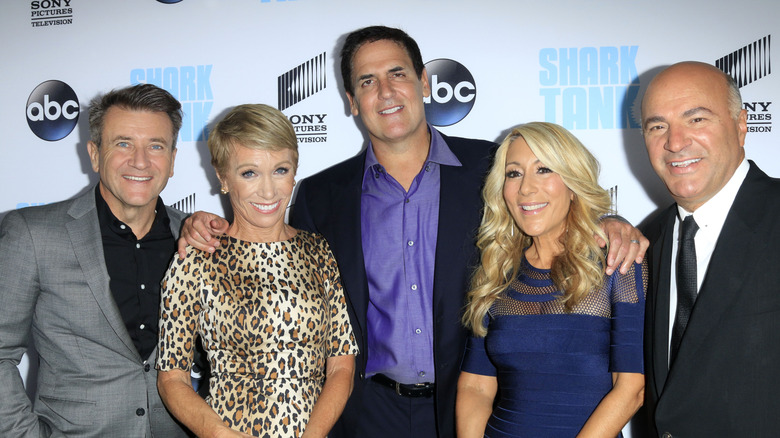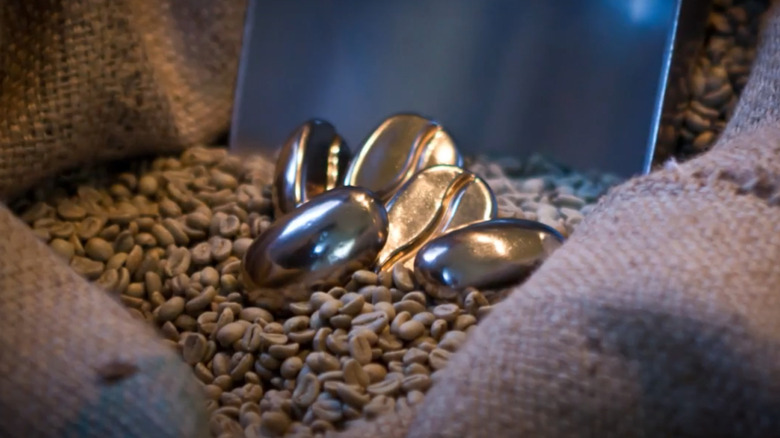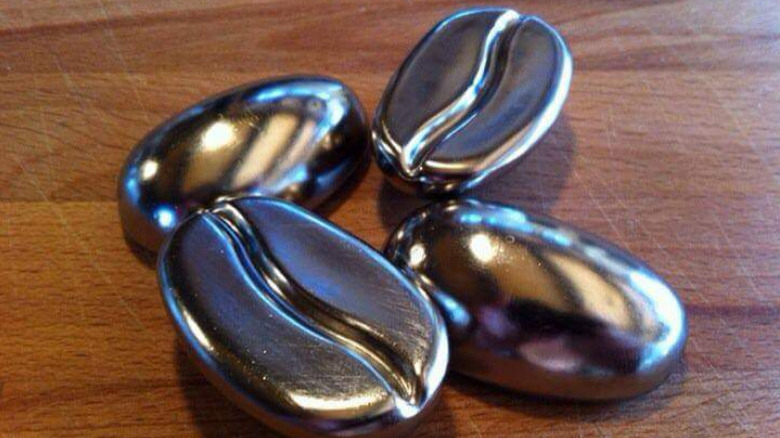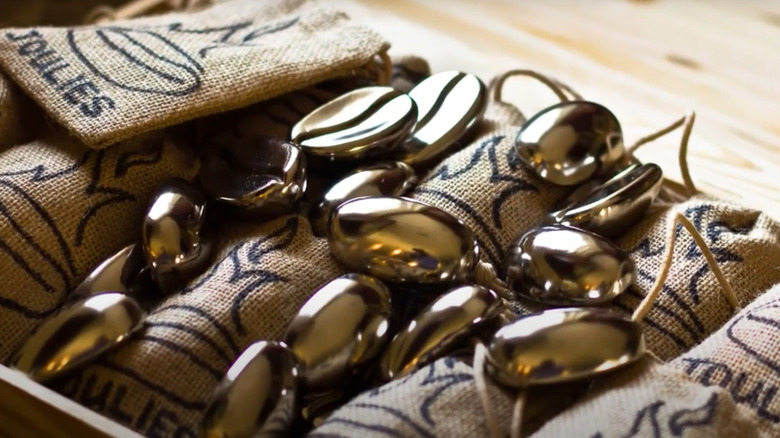Coffee Joulies: Here's What Happened After Shark Tank
A lot of Americans need a little caffeine in the morning, and most get it from coffee. However, whether you make it at home with great precision, pick it up from a local coffee shop (that somehow manages to stay open alongside big chains), or do indeed hit up the Starbucks that's on your way to work because you actually kind of like that burnt Starbucks taste, that first sip can be scalding. Inventors Dave Jackson and Dave Petrillo (known collectively as "The Daves") wanted to spare people's tongues that horrible fate, so they brought their creation, Coffee Joulies, to the "Shark Tank" in season 4, episode 14, which premiered January 11, 2013.
These stainless steel, enlarged coffee beans (a single Joulie is about three times the size of a penny), were actually filled with a material that absorbs heat when dropped into a steaming cup of hot liquid, bringing the temperature down to a pleasantly drinkable 140 degrees Fahrenheit. Then, when the temperature of the drink began to dip, they released the stored-up heat and kept the beverage at its imbibable temperature for up to five hours.
The Daves actually had a financial start thanks to a Kickstarter they began two years prior to appearing on "Shark Tank." However, they wanted a Shark to help them navigate the uncertain waters of wholesale accounts.
What happened to Coffee Joulies on Shark Tank?
David Jackson and David Petrillo, who were looking for $150,000 in return for a 5% stake in their company, pitched their product to a line-up of Sharks that included Mark Cuban, Kevin O' Leary, Lori Greiner, Daymond John, and Robert Herjavec, serving up steaming travel mugs of coffee that contained Coffee Joulies in them — with liquid that had been poured over three hours prior. The Sharks' interests were immediately piqued, especially after the Daves described how the material inside the Joulies worked. The Sharks were somewhat put off by the realization that they would need multiple Joulies in a standard travel mug of coffee, but the talk quickly turned to money, with Jackson and Petrillo reporting $575,000 in sales the previous year, and telling the Sharks they were on track to sell over $1 million for the current year.
O'Leary was the first Shark to make a move, offering them the $150K, but with a $6 royalty for every Joulie sold until he recouped his investment, and then $1 in perpetuity after that. Greiner joined him on the deal, and Herjavec followed suit, with John coming in after initially going out. Cuban offered a counter-deal of $250,000 for a 12% stake in the company, but with the stipulation that they move away from wholesale. The Daves ultimately ended up choosing the four-Shark deal, especially after O'Leary amended his initial offer, so that there was only a $3 royalty on wholesale sales.
Coffee Joulies After Shark Tank
After appearing on "Shark Tank," Dave Jackson and Dave Petrillo were incredibly pleased by the additional and widespread exposure their company, Coffee Joulies, received. While the Daves didn't give up many specific numbers in an interview with the Utica, New York-based Observer-Dispatch, they described big boosts in their business, both in sales and social media, larger even than expected; the company was tasked with making an additional 30,000 units after their episode of "Shark Tank" aired. They also expressed their pleasure not only at getting the funding they desired, but in not giving up any equity in their company. In that same interview, the Daves further described the deal they received on "Shark Tank" as an offer "to continue negotiating that deal."
As it happens, those ongoing negotiations came to naught — the two Daves ended up not taking the investment from the four Sharks and ended up not working directly with any of them (nor did they apparently start selling wholesale). In fact, Petrillo has described Coffee Joulies' stint on "Shark Tank" as more or less free advertisement, albeit very effective free advertisement. Ultimately, Petrillo still associates himself with Coffee Joulies as of 2025, but the company's growth has clearly slowed, judging by its almost nonexistent web presence.
Is Coffee Joulies still in business?
Coffee Joules is still technically a business, though its activity has slowed to a trickle. Here's what we know: The company's website is currently defunct and leads to an error page. The company's Facebook page is no longer available — it seems it was deleted or made private. Coffee Joulie's X account (formerly known as Twitter) is still active, but nothing has been posted on it since October 2015.
Despite these rather unpromising indications, though, the product does have a page on Amazon (though ordering is currently unavailable). And while many reviews from its page are from the 2010s, there are a few from the 2020s, which indicates that Coffee Joulies may still be manufactured, sold, purchased, and shipped — or the company is selling off existing remaining stock. In a surprising twist, Coffee Joulies are also being sold on a website called Thread & Leather, which primarily sells wallets — and is co-owned by Dave Jackson, who co-founded Coffee Joulies.
What's next for Coffee Joulies' founders?
Coffee Joulies, despite existing technically in name, is likely defunct practically, owing to its lack of Internet presence. What's being sold on the website Thread & Leather is likely remaining stock (if the transaction were to go through at all). And the space where Coffee Joulies were being manufactured, in a warehouse in Sherrill, New York, was simply rented by the company from Sherrill Manufacturing.
David Petrillo's LinkedIn account still lists him as President of Coffee Joulies from April 2011 until the present. It seems, however, that the company has not been his sole focus for some time, as he lists other professional pursuits additionally, and is currently putting his mechanical engineering degree to good use working for a robotics company, based in NYC, where he has been for at least a year.
David Jackson, as mentioned, founded a wallet company, which he still helms from both the website and an Etsy account (though its page has been on hiatus since December 2024). However, he also went back to his inventing roots and created something called a SpeedBoard, which looks to be a motorized skateboard, and can reach top speeds of 30 miles per hour.





